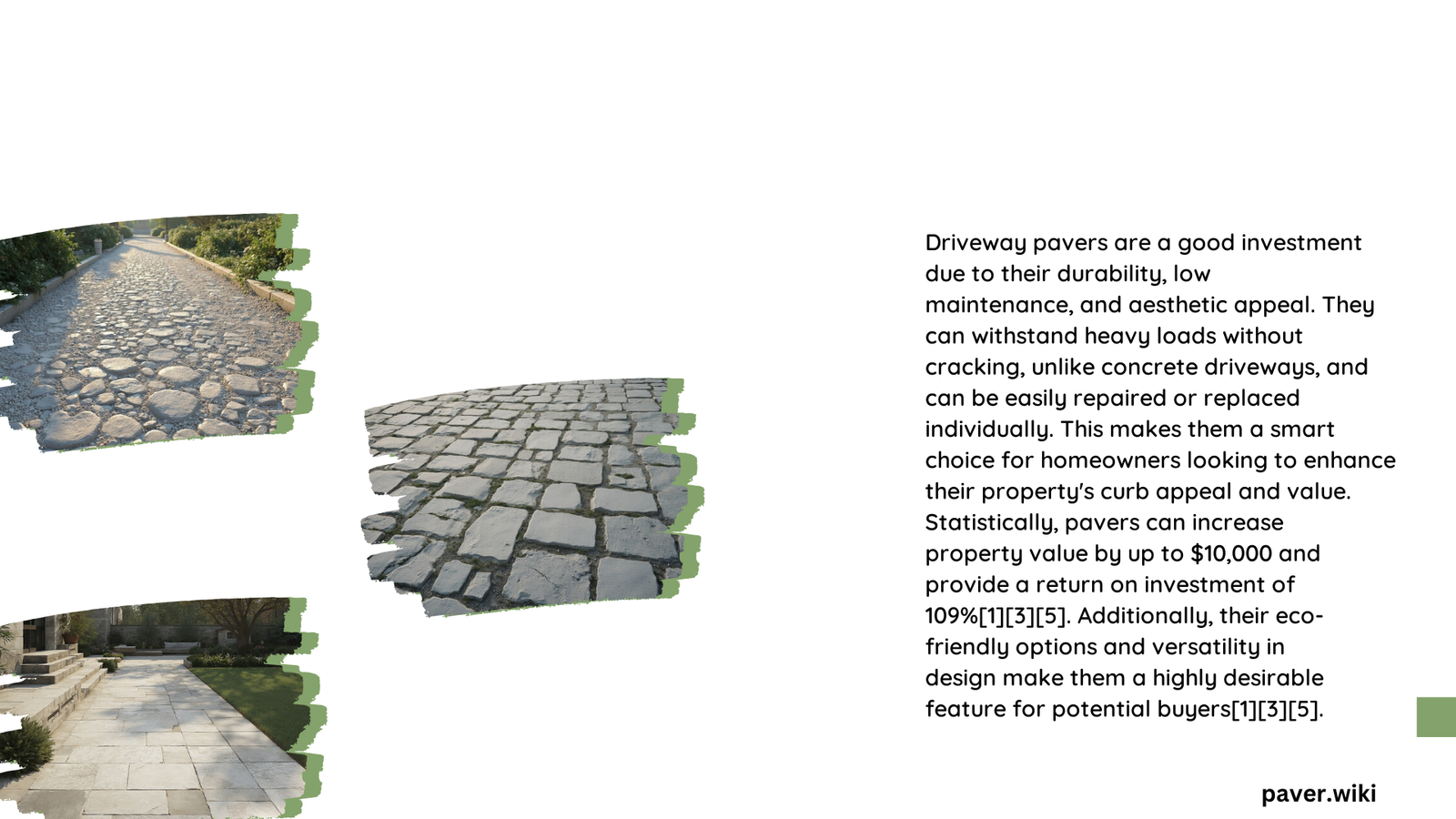Driveway pavers are a popular choice for homeowners looking to enhance their property’s curb appeal and functionality. With potential increases in property value, long-term durability, and aesthetic versatility, driveway pavers can be a wise investment. However, the initial costs, maintenance requirements, and various factors affecting their longevity must be carefully considered to determine if they are truly a good investment for your specific situation.
What Are the Financial Implications of Installing Driveway Pavers?
The financial aspect of installing driveway pavers is a crucial consideration for homeowners. Let’s break down the costs and potential returns:
What Are the Initial Costs Per Square Foot?
The cost of driveway pavers varies depending on the material and design complexity:
- Concrete pavers: $10 to $25 per square foot
- Brick pavers: $10 to $30 per square foot
- Cobblestone pavers: $20 to $70 per square foot
- Grass pavers: $10 to $20 per square foot
- Permeable pavers: $10 to $40 per square foot
What Are the Average Total Installation Costs?
For a typical two-car driveway (approximately 480 square feet), you can expect the following total costs:
| Paver Type | Cost Range |
|---|---|
| Concrete | $4,800 – $12,000 |
| Brick | $4,800 – $14,400 |
| Cobblestone | $9,600 – $33,600 |
| Grass | $4,800 – $9,600 |
| Permeable | $4,800 – $19,200 |
Are There Potential Hidden Expenses?
Yes, there are several potential hidden expenses to consider:
- Site Preparation: Costs can vary based on the need for excavation, grading, and base material installation.
- Drainage Solutions: Proper drainage is crucial, especially for sloped driveways, which may involve additional costs.
- Labor and Equipment: Complex designs or additional features like lighting can increase labor costs and equipment rental fees.
How Long Do Driveway Pavers Last?

The longevity of driveway pavers is a significant factor in determining their value as an investment.
What is the Expected Lifespan of Different Paver Types?
- Concrete Pavers: Over 30 years with minimal maintenance
- Brick Pavers: Up to 50 years or more
- Cobblestone Pavers: Often 50 years or more
- Grass Pavers: Typically 20-30 years
- Natural Stone Pavers: Up to 100 years
How Do Pavers Resist Cracking and Shifting?
Pavers are more resistant to cracking compared to concrete due to their modular nature. This allows for easy replacement of individual damaged pavers without disturbing the entire driveway.
What Factors Influence Paver Durability?
- Climate: Extreme weather conditions can affect paver durability.
- Installation Quality: Proper base preparation and interlocking significantly influence longevity.
- Maintenance: Regular upkeep is essential for maximizing the lifespan of pavers.
What Are the Maintenance Requirements for Driveway Pavers?
Understanding the maintenance needs of driveway pavers is crucial for assessing their long-term value.
How Often Do Pavers Need Maintenance?
- Sealing: Recommended every 2-3 years
- Cleaning: Regular sweeping and occasional power washing
- Repairs: As needed, typically less frequent than with concrete driveways
What Are the Associated Costs Per Maintenance Activity?
- Sealing: $0.10 to $0.30 per square foot
- Cleaning: Minimal for regular sweeping; power washing may cost $100 to $300 for a standard driveway
- Repairs: $5 to $20 per paver, depending on the material
How Does Neglect Impact Longevity and Appearance?
Neglecting maintenance can lead to:
– Paver shifting
– Cracking
– Erosion
– Reduced aesthetic appeal
Regular maintenance is crucial to extend the lifespan and maintain the appearance of the pavers.
What is the Return on Investment (ROI) for Driveway Pavers?
The ROI is a key factor in determining whether driveway pavers are a good investment.
How Much Can Pavers Increase Property Value?
Studies suggest that landscape upgrades, including paver installations, can recoup up to 100% of their value. Specifically, pavers can bring a return on investment of 109%, or a $3,563 increase in value for a $3,269 investment.
How Do Pavers Compare to Alternative Driveway Materials?
Compared to asphalt and concrete, pavers offer:
– Better long-term value
– Increased durability
– Easier repairs
– Enhanced aesthetic appeal
While the initial cost is higher, long-term savings on maintenance and repairs often offset this expense.
How Long Does It Take to Recoup Installation Costs?
The timeframe for recouping installation costs through enhanced curb appeal and durability can vary but is generally seen within a few years. The increased property value and lower maintenance costs contribute to a quick return on investment.
Are Driveway Pavers a Good Investment: The Verdict
Considering the factors discussed, driveway pavers can indeed be a good investment for many homeowners. They offer:
- Long-term durability
- Increased property value
- Aesthetic versatility
- Lower long-term maintenance costs
However, the high initial cost and need for regular maintenance should be carefully weighed against these benefits. Ultimately, the decision depends on individual circumstances, budget, and long-term property goals.
For those looking to enhance their home’s curb appeal, increase property value, and enjoy a durable, low-maintenance driveway solution, pavers can be an excellent investment. As with any significant home improvement project, it’s advisable to consult with professionals and obtain multiple quotes before making a final decision.
